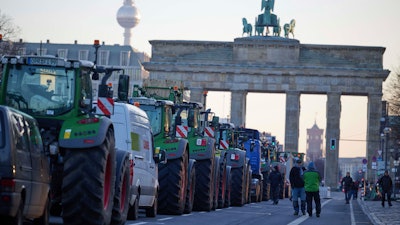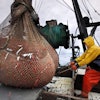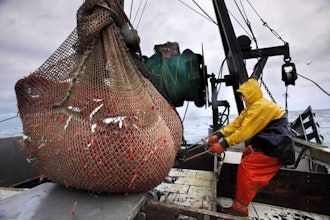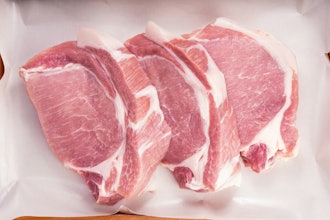
BERLIN (AP) — Farmers blocked highway access roads in parts of Germany Monday and snarled traffic elsewhere with their tractors, launching a week of protests against a government plan to scrap tax breaks on diesel used in agriculture.
Chancellor Olaf Scholz's unpopular three-party coalition infuriated farmers last month by drawing up plans to abolish a car tax exemption for farming vehicles and the diesel tax breaks. The proposals were part of a package to fill a 17-billion-euro ($18.6-billion) hole in the 2024 budget.
The government on Thursday climbed down partially, saying that the car tax exemption would be retained and the cuts in the diesel tax breaks would be staggered over three years. But the German Farmers' Association said it was still insisting on the plans being reversed fully and would go ahead with a "week of action" starting Monday.
In some areas, farmers used tractors to block entry roads to highways early Monday. There was disruption due to convoys of tractors in and around some cities, too. Production at a Volkswagen auto plant in Emden in northwestern Germany was stopped because access roads were blocked, preventing employees from getting to work, German news agency dpa reported.
Among demonstrations across the country, several hundred tractors and other vehicles gathered in front of the Brandenburg Gate in Berlin.
The protests are under scrutiny after a group of farmers on Thursday prevented Vice Chancellor Robert Habeck from disembarking a ferry in a small North Sea port as he returned from a personal trip to an offshore island.
That incident drew condemnation from government and opposition figures and the farmers association. Authorities have warned that far-right groups and others could try to capitalize on the protests. Farmers association chairman Joachim Rukwied told RBB Inforadio Monday that "we will ensure we are not infiltrated" by such groups.
Of the government's partial climbdown, Rukwied said: "This is absolutely insufficient. We can't carry this additional tax burden."
Scholz's spokesperson, Steffen Hebestreit, defended the government's actions. "There is no consideration inside the government of changing anything else about this," he said.
The budget revamp that included the disputed cuts was required after Germany's highest court annulled an earlier decision to repurpose 60 billion euros (almost $66 billion) originally meant to cushion the fallout from the COVID-19 pandemic for measures to help combat climate change and modernize the country. The maneuver fell afoul of Germany's strict self-imposed limits on running up debt.
On top of potential disruption caused by the farmers' protests, travelers in Germany face a nearly three-day strike later this week by a union representing many of the country's train drivers, which is stepping up its action against state-owned railway operator Deutsche Bahn in an unrelated dispute over working hours and pay.
The GDL union is calling on its members to walk out from 2 a.m. Wednesday until 6 p.m. Friday.






















